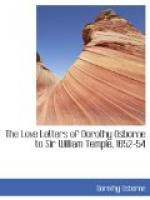Here is a new song,—I do not send it to you but to your sister; the tune is not worth the sending so far. If she pleases to put any to it, I am sure it will be a better than it has here. Adieu.
Letter 66.—“The Lost Lady” is a tragi-comedy by Sir William Berkely, and is advertised to be sold at the shop of the Holy Lamb in the year 1639, which we may take as the probable date of its publication. Dorothy would play Hermione, the heroine. We can imagine her speaking with sympathetic accent lines such as these:
With
what harsh fate does Heaven afflict me
That
all the blessings which make others happy,
Must
be my ruin?
The five Portugals to whom Dorothy refers as being hanged were the Portuguese ambassador’s brother, Don Pantaleon Sa, and four of his men. The Mercurius Politicus of November 1653 gives the following account of the matters that led to the execution; and as it is illustrative of the manners of the day, the account is here quoted at length:—
“NEW EXCHANGE IN THE STRAND. November 21.—In the evening there happened a quarrel between the Portugal ambassador’s brother and two or three others of that nation with one Mr. Gerard, an English gentleman, whom they all fell upon; but he being rescued out of their hands by one Mr. Anstruther, they retired home, and within an hour after returned with about twelve more of their nation, armed with breastplates and headpieces; but after two or three hours taken there, not finding Anstruther, they went home again for that night.
“November 22.—At night the ambassador’s brother and the rest returned again, and walking the upper Exchange, they met with one Col. Mayo, who, being a proper man, they supposed him to have been the same Anstruther that repelled them the night before; and so shooting off a pistol (which was as the watchword), the rest of the Portugals (supposed about fifty) came in with drawn swords, and leaving a sufficient number to keep the stairs, the rest went




